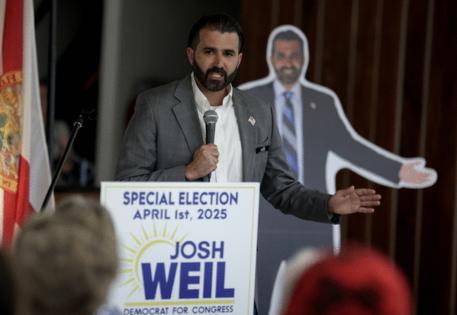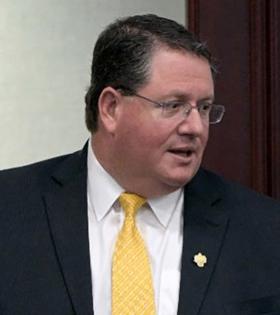Elections in Wisconsin and Florida pose first major test for GOP in 2025
Published in Political News
WASHINGTON — Tuesday marks one of the biggest political tests for Republicans this year, with a pair of special elections for House seats in Florida and a high-profile contest for a seat on the Wisconsin Supreme Court that will determine whether liberals maintain their majority on the bench.
The Wisconsin race, which is technically nonpartisan but has attracted millions in outside spending from partisan figures, had long been expected to be competitive. But the special election for Florida’s 6th District, where voters backed Donald Trump by 30 points in November, has also grown much closer. One poll last week showed Republican nominee Randy Fine with a lead within the margin of error over Democrat Josh Weil, who has benefited from a fundraising surge fueled by base anger at the Trump administration.
The results in both states, Wisconsin being a perennial battleground and Florida having become a safe bet for Republicans statewide, could offer clues about how motivated each party’s base is nearly five months after the November elections. And they come after Democrats flipped a state Senate seat in Pennsylvania last week and have had success in other down-ballot special elections this year.
A surprise race in Florida
The two House seats in Florida opened up following the resignations of Republican Reps. Michael Waltz and Matt Gaetz after each won reelection in November.
Both Fine and 1st District Republican nominee Jimmy Patronis, the outgoing Florida chief financial officer, received Trump’s encouragement and endorsement to run in the special elections for the deep-red seats.
But in the 6th District, which includes Daytona Beach, Fine has come under fire from GOP leaders who felt he wasn’t mounting an effective enough campaign in the race to succeed Waltz, who resigned in January to become Trump’s national security adviser.
In the weeks leading up to Election Day, a White House source told CNN that a top Trump adviser had personally warned Fine to shape up, while National Republican Congressional Committee Chair Richard Hudson and House Majority Whip Tom Emmer both reportedly told him to “get his sh-- together.”
Florida Gov. Ron DeSantis, no ally of Fine’s and who once represented an earlier version of the 6th District, cast downbeat expectations ahead of the election, telling reporters last week that he expected “a way underperformance” for the Republican nominee.
“Is that a reflection on the president? Absolutely not. It’s a reflection of the candidate that’s running in that race,” DeSantis said.
Campaign filings show that Weil’s campaign raked in contributions totaling more than $9 million through March 12, outraising Fine by roughly 10 to 1. Fine has since loaned his campaign $400,000 and has benefited from ad spending of nearly $1 million by the Florida GOP, Politico reported.
Fine served eight years in the Florida House before being elected to the state Senate in November. Just weeks later, he announced his campaign for the House after Trump picked Waltz to join his administration and endorsed Fine. He resigned from his state Senate seat — which was effective Monday — under Florida’s resign-to-run law.
Weil, a public school math teacher, mounted his campaign for the 6th District as a “proud progressive.” He briefly ran for Senate in 2022.
Meanwhile, in the 1st District, located at the western end of the Florida Panhandle, Patronis faces off against Democrat Gay Valimont in the special election to succeed Gaetz.
Gaetz resigned in November, hours after Trump had nominated him to serve as attorney general. He ultimately bowed out amid sexual misconduct allegations and the specter of a then-unreleased ethics report. He did not take the oath of office for the 119th Congress.
A fixture in Florida politics for nearly two decades, Patronis previously served in the Florida House and as an appointed member of the state’s Public Service Commission. He’s been elected twice as state CFO, a position he resigned from Monday in advance of the special election.
Like Fine in the 6th District, Patronis was also outraised by his Democratic opponent: Valimont, an anti-gun violence activist, brought in more than $6 million through March 12, compared with $2.1 million for Patronis, according to Federal Election Commission records. But this race has not drawn the same national scrutiny as the Fine-Weil contest, with Republicans appearing more secure to hold a district that Trump carried by 37 points in November, according to calculations by elections analyst Drew Savicki.
Trump hosted telephone rallies for both Fine and Patronis last week, Florida Politics reported. He praised Fine’s early endorsement of him in the 2024 presidential primaries and said voters should make Patronis’ margin of victory “too big to rig.”
A judicial race gets nationalized
The Wisconsin Supreme Court race, which features two circuit court judges, has become one of the most nationalized contests since last year’s elections, when Trump won the Badger State while Democrat Tammy Baldwin was reelected to the Senate. It is also the most expensive state high court race in U.S. history.
Brad Schimel, a Waukesha County circuit court judge and Republican former state attorney general, is backed by conservatives and faces Susan Crawford, a Dane County circuit court judge who previously served in the administration of a Democratic governor and has consolidated liberal support.
The election will determine whether liberals maintain their 4-3 majority on the state’s highest court, or whether conservatives can win back control after losing it two years ago for the first time in over a decade. High-profile issues that could come before the court after this election include abortion rights, election law and union rights.
The contest could also help gauge which party is doing a better job of getting their voters to the polls, as well as what messaging is resonating with voters.
Elon Musk, the billionaire and close adviser to Trump who leads his Department of Government Efficiency effort, has played an outsize role in the race. His political organizations have spent more than $18 million in support of Schimel through Monday, according to a compilation by the Brennan Center, prompting Democrats to tie the Tesla owner to the conservative candidate in their advertising. Musk has been urging Wisconsin voters to support Schimel on X, the social media platform he owns, and campaigned in the state over the weekend.
While the contest could further test Musk’s power as a political figure on the right, it also tests Democrats’ burgeoning messaging, both on air and on the ground, that focuses on Musk as a political villain.
Wisconsin voters on Tuesday will also weigh in on a ballot referendum that proposes to add a voter identification requirement to the state constitution. Under current law, voters are already required to show ID in Wisconsin, but proponents of the ballot measure argue that a constitutional amendment would do more to protect the law from legal challenges.
©2025 CQ-Roll Call, Inc., All Rights Reserved. Visit cqrollcall.com. Distributed by Tribune Content Agency, LLC.































































Comments